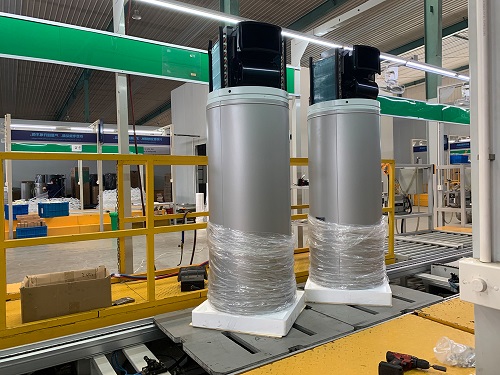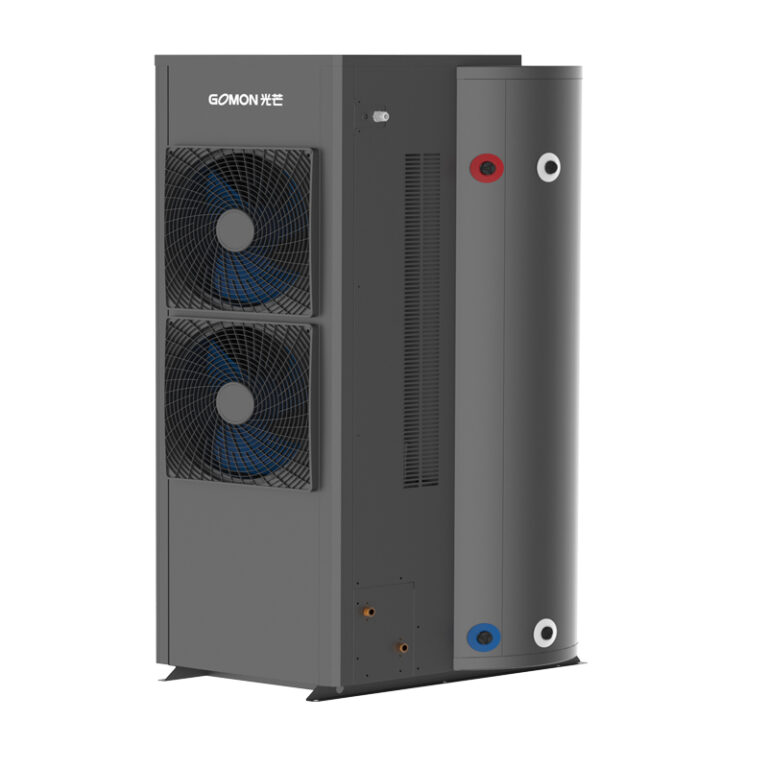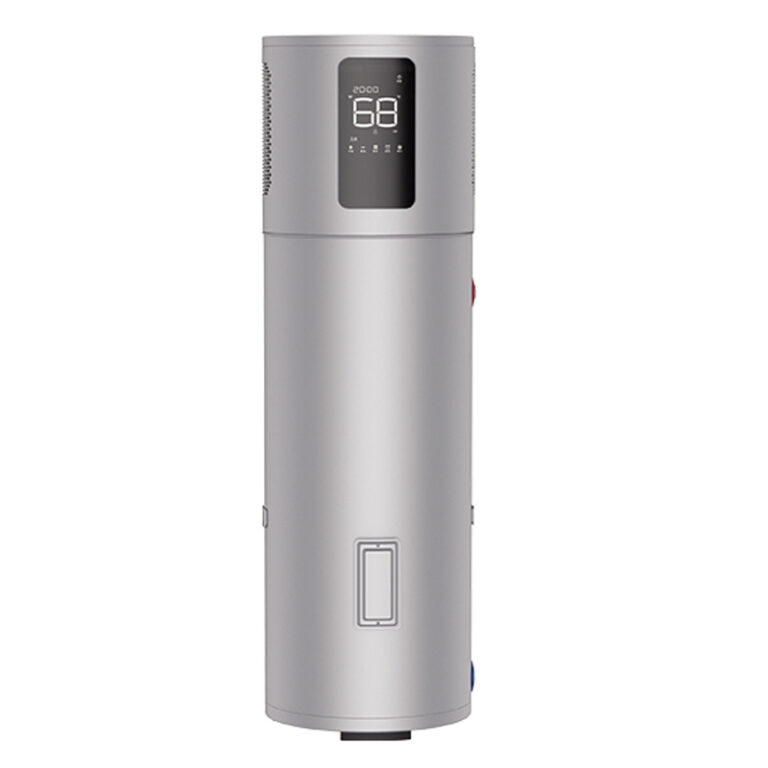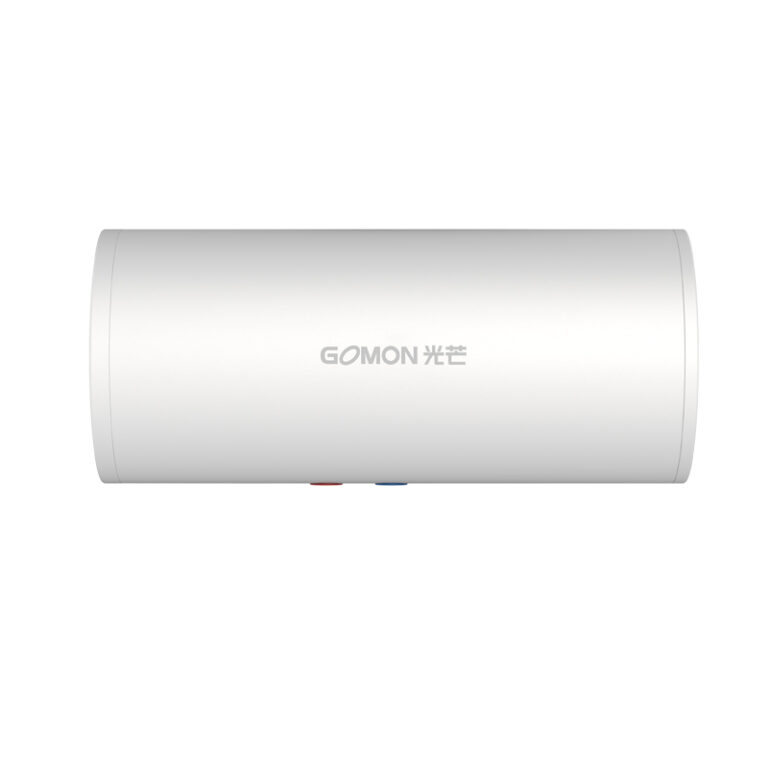Pompes à chaleur air-eau sont un choix de plus en plus populaire pour l'eau chaude sanitaire Ces pompes sont économes en énergie et respectueuses de l'environnement. Ces pompes sont efficaces sur le plan énergétique, respectueuses de l'environnement et peuvent permettre aux propriétaires d'économiser de l'argent sur leurs factures d'électricité. chaleur co2 Les pompes à chaleur fonctionnent en transférant l'énergie thermique d'une source à une autre. Dans ce cas, la pompe à chaleur air-eau absorbe l'énergie thermique de l'air et la transfère à l'eau, qui est ensuite utilisée pour l'eau chaude sanitaire. Les pompes à chaleur ont de multiples usages, du chauffage des bâtiments à climat froid à la production d'eau chaude pour les habitations et les entreprises.
Les pompes à chaleur air-eau sont particulièrement intéressantes pour les systèmes de production d'eau chaude sanitaire, car elles permettent non seulement de réduire les coûts énergétiques, mais aussi de réduire la consommation d'eau jusqu'à 50 %. En outre, elles sont beaucoup plus silencieuses que les chauffe-eau traditionnels et nécessitent moins d'entretien. Pour les propriétaires désireux d'économiser de l'argent et de réduire leur impact sur l'environnement, les pompes à chaleur air-eau sont la solution idéale.

Introduction aux pompes à chaleur air-eau
Une pompe à chaleur air-eau est un type de pompe à chaleur qui utilise l'air extérieur pour chauffer de l'eau à des fins domestiques et commerciales. La pompe à chaleur air-eau utilise l'air extérieur comme source de chaleur et fait circuler un réfrigérant pour transférer la chaleur de l'air à l'eau. Les pompes à chaleur air/eau sont très efficaces et peuvent contribuer à réduire les coûts énergétiques en profitant de la température de l'air extérieur pour chauffer l'eau pour les douches chaudes et d'autres usages.
Les pompes à chaleur air/eau utilisent des serpentins réfrigérants qui captent la chaleur de l'air extérieur. Cette chaleur est ensuite transférée par les serpentins vers un réservoir de stockage ou directement vers la source d'eau. Un compresseur fait ensuite circuler le fluide frigorigène pour transmettre la chaleur de l'air à l'eau. L'air refroidi est ensuite rejeté dans l'atmosphère.
Ce système est plus efficace que d'autres systèmes de chauffage tels que les chaudières à gaz et les systèmes électriques, car la pompe à chaleur air/eau a le potentiel de collecter deux fois la quantité d'énergie thermique à partir de la même quantité d'énergie utilisée par ces autres systèmes.
Qu'est-ce qu'une pompe à chaleur air-eau pour usage domestique ?
Une pompe à chaleur air-eau est un moyen efficace de chauffer une maison. Ces pompes fonctionnent en extrayant la chaleur de l'air extérieur, qui est ensuite utilisée pour chauffer l'eau qui circule dans toute la maison. Cela permet d'obtenir une température constante et confortable, tout en respectant l'environnement et en réduisant les coûts énergétiques.
Avantages des pompes à chaleur air-eau
- Économies de coûts : Les pompes à chaleur air-eau sont très efficaces, ce qui signifie qu'elles économisent de l'énergie et coûtent beaucoup moins cher à exploiter que les systèmes de chauffage et de refroidissement traditionnels. Elles constituent donc un choix intéressant pour les propriétaires d'immeubles commerciaux et résidentiels qui cherchent à réduire leurs coûts énergétiques.
- Respect de l'environnement : Les pompes à chaleur air-eau sont beaucoup plus respectueuses de l'environnement que les systèmes de chauffage et de refroidissement traditionnels. Elles ne brûlent pas de combustibles fossiles et n'émettent pas de contaminants dans l'air. Elles peuvent donc contribuer à réduire les émissions de gaz à effet de serre et les autres dommages causés à l'environnement par les systèmes traditionnels.
- Facilité d'installation et d'entretien : Les pompes à chaleur air-eau sont beaucoup plus simples à installer et à entretenir que les systèmes de chauffage et de refroidissement traditionnels, car elles ne nécessitent qu'un minimum de connaissances techniques et d'équipement spécialisé.
- Polyvalence : les pompes à chaleur air-eau sont incroyablement polyvalentes, car elles peuvent être utilisées à diverses fins, du chauffage et du rafraîchissement des locaux à la production d'eau chaude. En outre, elles peuvent être utilisées dans les bâtiments commerciaux et résidentiels, et conviennent donc à la plupart des propriétés.
- Fonctionnement silencieux : Les pompes à chaleur air-eau sont conçues pour fonctionner de manière très silencieuse, de sorte qu'elles peuvent être utilisées dans des zones où le niveau de bruit doit être réduit au minimum.
Qu'est-ce qu'une pompe à chaleur à air pour l'eau chaude ?
Une pompe à chaleur à air peut être un moyen efficace de chauffer l'eau de votre maison. Ce type de pompe à chaleur fonctionne en extrayant la chaleur de l'air extérieur et en l'utilisant pour chauffer l'eau de votre maison. Il peut s'agir d'une alternative rentable et écologique aux méthodes traditionnelles de chauffage de l'eau.
Applications des pompes à chaleur air-eau dans les systèmes de production d'eau chaude sanitaire
Les pompes à chaleur air-eau sont utilisées depuis plusieurs années dans les systèmes de production d'eau chaude sanitaire. Ces systèmes sont conçus pour capter l'énergie thermique de l'air extérieur et l'utiliser pour chauffer l'eau sanitaire. L'utilisation d'une pompe à chaleur air-eau pour la production d'eau chaude sanitaire présente plusieurs avantages par rapport aux systèmes traditionnels de production d'eau chaude électrique.
- Consommation d'énergie réduite : Les pompes à chaleur air-eau fonctionnent avec une fraction de l'énergie utilisée par les systèmes de production d'eau chaude électrique, ce qui les rend très efficaces sur le plan énergétique.
- Augmentation du volume d'eau chaude : Les pompes à chaleur air-eau sont capables de fournir de plus grands volumes d'eau chaude que les systèmes d'eau chaude électriques traditionnels. Cela est utile dans les maisons où plusieurs personnes partagent un même réservoir d'eau chaude ou lorsque plusieurs salles de bains ou robinets sont fréquemment utilisés.
- Réduction des coûts : La diminution de la consommation d'énergie se traduit en fin de compte par une réduction des factures d'énergie. Dans certains cas, en fonction du tarif de l'électricité et du climat, ces systèmes peuvent produire de l'eau chaude presque gratuitement, ce qui permet de réaliser d'importantes économies au fil du temps.
- Empreinte carbone réduite : La consommation d'énergie réduite des pompes à chaleur air-eau se traduit par une diminution des émissions de gaz à effet de serre, ce qui améliore la qualité de l'air et contribue à la protection de l'environnement.
Fonctionnement des pompes à chaleur air-eau
Les pompes à chaleur air-eau sont des systèmes très efficaces utilisés pour chauffer les habitations et les entreprises. Elles utilisent l'air extérieur pour transférer la chaleur dans un liquide. Ce liquide est ensuite utilisé pour fournir de l'eau chaude et/ou chauffer les locaux.
La pompe à chaleur utilise un serpentin d'évaporation pour extraire la chaleur de l'air extérieur. Elle utilise ensuite un compresseur pour augmenter la chaleur et la transférer au fluide frigorigène qui circule dans le système. Le fluide frigorigène est ensuite transféré au condenseur, où il est utilisé pour chauffer un liquide - soit de l'eau, soit un mélange d'eau et d'antigel.
Ce liquide est ensuite pompé dans des serpentins de tubes installés dans le sol ou les murs de votre maison. Lorsque le liquide traverse le serpentin, il absorbe la chaleur de l'air et la libère dans l'air de votre maison.
Le système comprend également une vanne d'inversion qui peut inverser le sens du flux, ce qui permet à la pompe à chaleur de refroidir votre maison pendant l'été. La pompe à chaleur inverse le cycle, en absorbant la chaleur à l'intérieur de votre maison et en la rejetant à l'extérieur.
Les pompes à chaleur air-eau sont efficaces, durables et écologiques.
Pompe à chaleur air-eau pour usage résidentiel
Les pompes à chaleur air-eau sont un choix populaire pour les systèmes d'eau chaude résidentiels en raison de leur efficacité énergétique et de leurs faibles coûts d'exploitation. Ces systèmes fonctionnent en extrayant la chaleur de l'air extérieur et en la transférant à l'eau d'un réservoir de stockage.
Il en résulte un approvisionnement constant en eau chaude pour l'usage domestique, même pendant les mois les plus froids. En outre, les pompes à chaleur air-eau sont respectueuses de l'environnement et peuvent aider les propriétaires à réduire leur empreinte carbone.
Pompe à chaleur air-eau pour les petits ménages
Une pompe à chaleur air-eau est un système de chauffage économe en énergie qui peut constituer une option intéressante pour les petits ménages. Ce type de pompe à chaleur fonctionne en extrayant la chaleur de l'air extérieur et en la transférant dans le système de chauffage de l'eau de votre maison.
Le choix d'une pompe à chaleur air-eau pour votre petite maison présente de nombreux avantages. Tout d'abord, elles sont très efficaces et peuvent vous faire économiser beaucoup d'argent sur vos factures d'énergie. Elles nécessitent également très peu d'entretien et sont très faciles à installer.
Un autre avantage des pompes à chaleur air-eau est qu'elles sont très respectueuses de l'environnement. Elles utilisent des sources d'énergie renouvelables et produisent très peu d'émissions de carbone, ce qui est excellent pour la planète.
Lorsque vous choisissez une pompe à chaleur air-eau pour votre petite maison, vous devez tenir compte de plusieurs éléments. Vous devez tenir compte de la taille et de l'agencement de votre maison, ainsi que de votre consommation d'eau chaude. Il est également important de choisir une marque réputée et de confier l'installation à un professionnel qualifié.
Avantages et inconvénients des pompes à chaleur air-eau
Pour :
- Efficace : Les pompes à chaleur air-eau sont très efficaces car elles utilisent l'air ambiant pour fournir de la chaleur. Cela signifie qu'elles sont beaucoup plus efficaces que d'autres systèmes de chauffage tels que les chaudières à gaz ou à mazout et qu'elles peuvent réduire considérablement vos factures d'énergie.
- Respect de l'environnement : les pompes à chaleur ne nécessitent pas l'utilisation de combustibles fossiles ni d'émissions de gaz à effet de serre, ce qui en fait un choix beaucoup plus respectueux de l'environnement.
- Peu d'entretien : Les pompes à chaleur air-eau comportent très peu de pièces mobiles, ce qui les rend peu exigeantes en termes d'entretien.
- Polyvalence : les pompes à chaleur peuvent être utilisées pour le refroidissement comme pour le chauffage, ce qui en fait une option idéale pour les climats où les étés sont chauds et les hivers froids.
Cons :
- Coûteux : Les pompes à chaleur air-eau sont généralement plus coûteuses que les autres solutions de chauffage.
- Efficacité limitée : Les pompes à chaleur perdent beaucoup de leur efficacité lorsque la température descend en dessous du point de congélation, ce qui peut entraîner des factures d'énergie plus élevées en hiver.
- L'installation : Les pompes à chaleur air-eau nécessitent une installation plus complexe que les systèmes de chauffage traditionnels.
- Applications limitées : Les pompes à chaleur ne peuvent pas être utilisées dans les régions où les températures sont trop basses, comme dans certaines régions du Canada.
Une pompe à chaleur à air peut-elle fournir de l'eau chaude sanitaire ?
Qu'est-ce qu'une pompe à chaleur à air ? La pompe à chaleur air-air, parfois appelée pompe à chaleur air-eau, transfère la chaleur de l'air extérieur à l'eau et chauffe votre pièce par l'intermédiaire d'un radiateur ou d'un plancher chauffant. Elle peut également chauffer l'eau stockée dans le réservoir d'eau chaude pour votre robinet d'eau chaude, votre douche et votre baignoire.
Quel type de pompe à chaleur est généralement utilisé pour fournir de l'eau chaude sanitaire ?
La pompe à chaleur géothermique utilise un compresseur pour chauffer votre maison. Le compresseur génère de la chaleur supplémentaire, qui est la chaleur que nous utilisons pour préchauffer votre réservoir d'eau chaude domestique. Le désurchauffeur utilise une pompe et un échangeur de chaleur pour collecter la chaleur supplémentaire et la stocker dans votre réservoir d'eau électrique.
Considérations sur les coûts
Le coût d'une pompe à chaleur air/eau pour l'eau chaude sanitaire peut varier considérablement en fonction de la taille, de la marque et d'autres caractéristiques de l'unité. En général, le coût d'installation d'une pompe à chaleur air/eau est plus élevé que celui d'un chauffe-eau sans réservoir, mais peut être inférieur à celui d'un chauffe-eau standard de type réservoir. En outre, le coût du système peut dépendre des caractéristiques supplémentaires ou des modifications requises, ainsi que de la complexité de l'installation. Il peut également y avoir des incitations supplémentaires en matière d'efficacité énergétique qui peuvent réduire le coût total du système. Une analyse des besoins en chauffage de votre maison ou de votre entreprise doit être effectuée pour déterminer la taille et le type de système les plus appropriés.
Dans la plupart des cas, les pompes à chaleur air/eau ont un retour sur investissement plus long que les autres systèmes de chauffage de l'eau, car elles sont généralement plus efficaces et permettent de réduire considérablement les coûts de chauffage au fil du temps. Les coûts d'installation peuvent aller de plusieurs centaines à plusieurs milliers de dollars, selon le type de système et les exigences de l'installation. En revanche, les économies d'exploitation réalisées grâce aux pompes à chaleur air/eau peuvent être beaucoup plus importantes. Ces économies peuvent être réalisées grâce à des factures d'énergie moins élevées, à une durée de vie plus longue et à d'autres coûts réduits liés à l'utilisation des pompes à chaleur air/eau.
Voici quelques lignes directrices pour vous aider : combien coûte une pompe à chaleur air-eau, distributeur de pompes à chaleur air-eau, pompe à chaleur air-eau basse température




